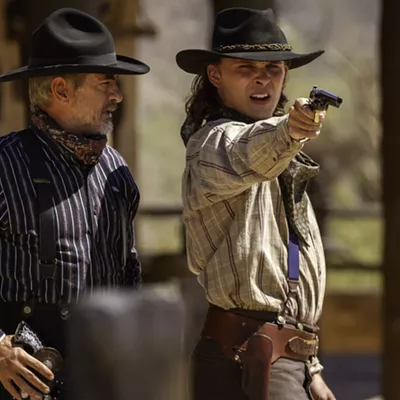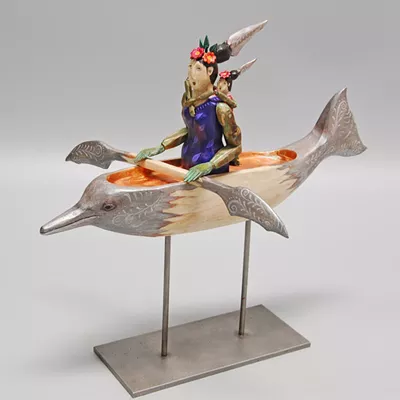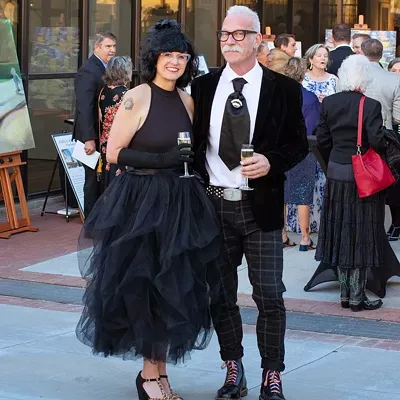Playwright Milta Ortiz just can't get used to the dirt. A recent transplant from California by way of Chicago, she has been continuously befuddled by her black boots and their propensity to be magnets for her new home's desert dust.
"I will clean and shine them, and a few minutes later it will be like I never had." So she says, "I finally got it. I don't really bother with it now."
We trust that she will come to embrace this simply-the-way-it-is truth of her new home, and as the author of Borderlands Theater's holiday Pastorela, she has already grown to understand and embrace this Tucson tradition.
This year Milta and her husband Marc Pinate, who is the new artistic director of Borderlands, are working as a team to give the 2015 version of the Pastorela new life. Due to funding issues, the play was not staged last year, which caused all kinds of distress for Tucsonans who have embraced the show as a hallowed tradition.
It's back, Ortiz says, because "so many Borderlands patrons asked for it." As a result of the continued lack of funding, she says, some adjustments have had to be made, including moving to the much smaller Cabaret Theater at the Temple of Music and Art from the Leo Rich Theatre on the Tucson Community Center grounds. However, Ortiz feels there will continue to be plenty to please the patrons.
"I wrote it in 2013 when I first landed here. I didn't quite understand what the Pastorela was. I'm Salvadorian...and this is not a tradition for Salvadorians. It is a big thing for Latinos in California, but I really wasn't familiar with it," she says. "So, it was all brand new and I didn't fully understand what it was. I still wrote the play, but I feel like this year, I get it."
It involves a very different way of working, Ortiz says. "It's a very formulaic play. For writers sometimes that's a little hard because we're used to doing our own thing, not working with a formula. And there are ghostwriters who are very married to the tradition and not always able to articulate what it is that they want. But I think I figured it out this time. It's all in rhyming couplets. It's very much like Dr. Seuss in that rhythm. That's very important. I really get what the intention of the play is. And I've had a lot of fun with it. The first year I was trying to understand it, while this year I just get to relax and have fun and be lighthearted and playful."
Since there's always a fair amount of social commentary built into the play, Ortiz says she had an abundance of material to choose from this year, "mostly because of the upcoming presidential election and the GOP candidates."
It also is topical in other ways. "I did a lot of intense researching online the biggest pop cultural events and characters."
Then, there is always this curious credit given to "the ghostwriters." Who are they?
"This is a collaborative process. We all get together, and everyone throws out ideas." Then Ortiz works with those ideas, the group comes together again and Ortiz gets feedback.
"At a performance, when Barclay (Goldsmith, founder and long time leader of Borderlands) introduces the ghostwriters, no one stands up. We are not supposed to know who they are."
It's not clearly known how the Pastorela originated. "I talked to Barclay, and the Pastorela has always had political satire/social commentary inclinations. It's evolved over the years into this form."
According to Goldsmith, Ortiz says, it's been around since the ninth century in France and Spain, but because of its irreverence, it was disliked by bishops. When the conquistadors came to the Americas, missionaries became interested in it as a tool to convert the native peoples. It fell out of favor around the time of the Mexican revolution in 1910, but is now firmly established in Mexico and in Mexican-American populations.
Really though, it's the universality of the story that has really provided its longevity.
"It's definitely the hero's journey," says Ortiz, "and people innately understand that journey even though they don't know that's what they're watching. The Devil's three temptations; evil never wins; we need others to help us, and then we overcome. Here, of course, in the end there's the birth of Jesus, so we celebrate rebirth. It's really simple when you think about it."
The Pastorela's humor is a departure for Borderlands because they tend to do serious, socially conscious plays, and it's nice to have a reprieve from that, to have a good time and laugh, says Ortiz.
Although there are always three devilish temptations, there is always one deadly sin portrayed in the show, but it changes every year. This year it's envy, which is represented by Donald Trump, Carly Fiorina and Ted Cruz, all costumed and played by cast members. Attempting to foil them will be shepherds Elvis and Celine Dion—and this is only a third of the action in the play.
"The Pastorela is intergenerational undertaking," says Ortiz, which makes it really an unusual-and-desirable exercise. There are always children in the cast. There's also music, which is a critical part of the adventure, and the waila variety, developed by the Tohono O'odham, will provided by Gertie and TO Boyz (Gertie Lopez, Steve Garcia, and Eric Garcia). Eva Tessler and Marc Pinate are directing.
So, Tucson Pastorela fans, here's your chance to celebrate in both old and new ways, and embrace once again the Borderlands version of Tucson's most in-demand creations.






